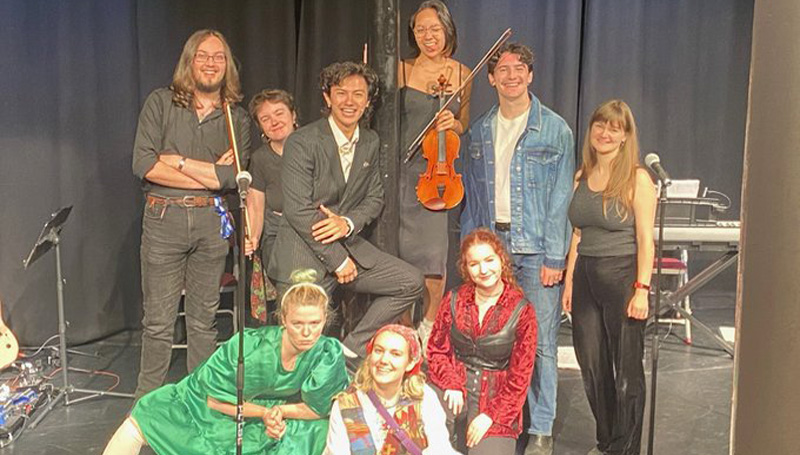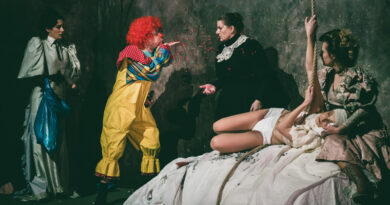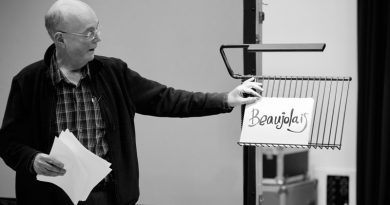“Medea the Musical”, Edinburgh Festival Fringe 2022
Jeremy Malies at Paradise in Augustines
5 September 2022
“A rock concert in a courtroom” was the tagline. This was framed as a celebrity trial with the audience as jurors. It was an interesting take on the 2,500-year-old plotline by Euripides and certainly wasn’t just rock, with music of many forms including some exquisite ballads, folk and a jazz number.
The audience watched (in flashback) through the eyes of Aegeus who was portrayed somewhat ponderously as an attorney and media interpreter by Xander Pang. As narrator but also an active agent in the plot, he could constantly break the fourth wall and congratulate himself on a witticism, an ad lib or a smooth segue. Pang finally asked us, as a cliff hanger, whether Medea (Hayley Canham) should be acquitted.
This was hardly Cole Porter with clunking lyrics such as: “Your heart is an island I can’t seem to find …” If I had been nearer the exit, one too many brushes with the lip mics early on (bizarre since this was the penultimate day of a 13-performance run) would have had me up and out.
But the contemporary plot devices became more and more witty and began to keep me interested. No poisoned robes and coronet here: anaphylaxis sees off Glauce (Dixie McDevitt) when nuts are added to a dish of pasta. She remained onstage as a brassy ghost while Medea was gaslit. I get it that Jason (Gabriel Jones) hasn’t fallen in love with Glauce’s mind. But McDevitt could usefully have acquired light and shade however broad the overall approach. She veered towards caricature.
Midway through I snapped out of Eeyore mode and began to focus on the many good things here, perhaps warming to the piece for the simple reason that, unlike so many fringe musicals I’ve seen by young companies, there were four fantastic and distinct voices on show as well as much wonderful part-singing.
Instrumental work (led from keyboards by musical director Fleur Gardner-Wray) was also first-rate as she marshalled cello, violin and guitar. The rhyming couplets became snappier (lyrics also by Canham) and a tide of swooping melody began to charm me as Gabriel Jones (playing Jason) proved outstanding in a duet with Canham in which he suggested a countertenor. This treatment might ride roughshod over the plot as written, but Canham gave characters amusing lines in self-deprecation as Glauce told us: “I should have died four songs ago!”)
As with Simon Stone’s version at the Barbican, there was a corporate backdrop but here Medea was working for a company owned by the (unseen) Creon. She was made redundant as part of the rejection. Social observation (particularly in the song “Two Peas in a Pod”) became sharp and endearing.
House lights remained partially up throughout, and we were reminded regularly of our duties as a jury. There was no doubt that we were observing a patriarchy that is obsessed with bloodlines, but director Maria Telnikoff ensured that the feminist messages were never unwieldy. Just for once I should have welcomed some video projection; perhaps footage of the characters entering court (scope to include a Greek chorus) and a news anchor talking about the trial. This production grew on me and included some exceptional work.









